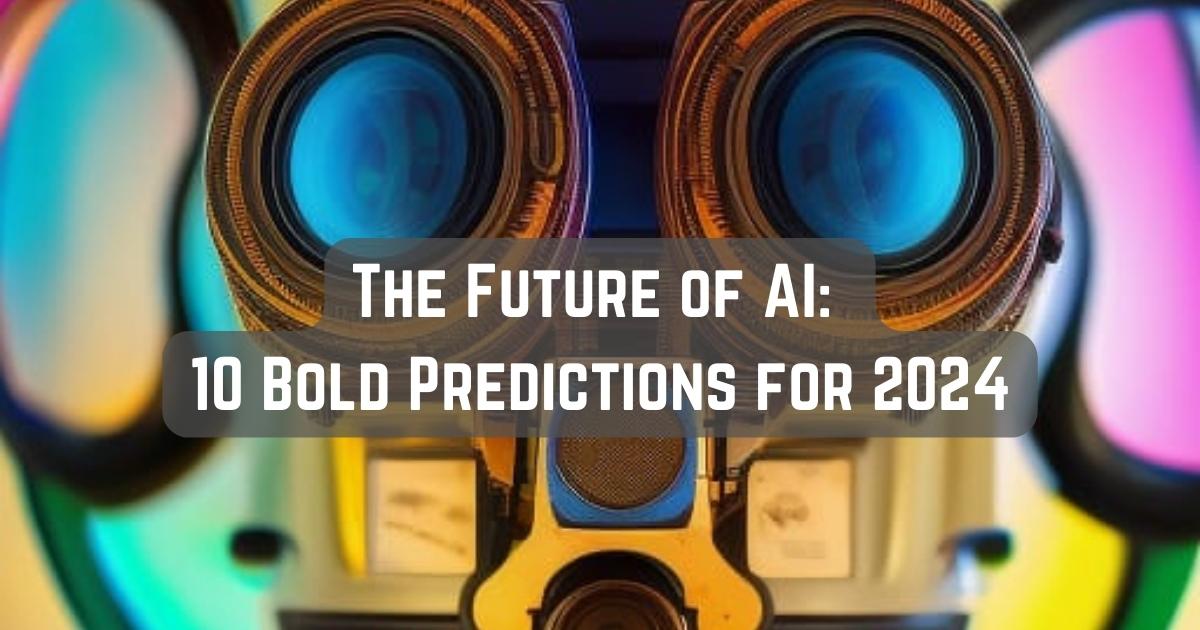
“Once again Saltmarch has knocked it out of the park with interesting speakers, engaging content and challenging ideas. No jetlag fog at all, which counts for how interesting the whole thing was."
Cybersecurity Lead, PwC

The State of AI Report 2023, produced by AI investors Nathan Benaich and the Air Street Capital team, has once again provided a comprehensive analysis of the most compelling developments in the field of artificial intelligence. The report covers a range of key dimensions, including technology breakthroughs, commercial applications, regulatory landscapes, and safety considerations. It also offers predictions, which serve as a performance review to keep the industry honest.
In this article, we'll delve into ten bold predictions for 2024, extrapolating from the State of AI Report and other industry trends. These predictions are speculative in nature but grounded in current developments and expert opinions.
As the 2024 U.S. elections loom, imagine a generative AI media company under the federal microscope for its role in the electoral process. Far-fetched? Hardly. The State of AI Report 2023 has already spotlighted the intensifying debates around AI safety, indicating that governments and regulators are gearing up for action. This isn't speculative; it's a prelude to a high-stakes investigation into the ethical and legal complexities of AI-generated media in political campaigns.
Recent developments make this scenario increasingly likely. For instance, Freedom House's Freedom on the Net 2023 report highlights how governments are leveraging advances in AI to amplify crises in human rights online. Additionally, a study by Harvard's Misinformation Review raises concerns that generative AI could "trigger the next misinformation nightmare". These are not isolated instances but signs of a future where self-improving AI agents will not just meet but exceed the state-of-the-art in a variety of complex environments.
In this dynamic landscape, it's not a question of if a generative AI media company will be investigated in connection with the 2024 elections, but when. The technological and regulatory gears are already in motion, setting the stage for the next U.S. elections to become a landmark event in the annals of AI governance.
Imagine a cinematic experience where the visual effects are not just breathtaking but revolutionary, thanks to a Hollywood-grade production leveraging generative AI. This isn't a futuristic vision; it's imminent. The State of AI Report 2023 has already underscored significant progress in AI applications, including in the entertainment sector. We're on the cusp of a transformative shift in filmmaking.
Recent data shows that about 96% of AI decision-makers in media and entertainment plan to increase their spending on generative AI technology in the next 12 months. Generative AI tools from AI Video startup Runway were also used in the 2022 film "Everything Everywhere All at Once," showcasing its potential. Moreover, Hollywood actors are increasingly concerned about the use of AI, indicating its growing influence in the industry.
So, it's not a question of if a blockbuster will employ generative AI for visual effects, but when. And when it does, it will be a watershed moment for both the film industry and the role of AI in creative ventures.
Envision a near-future where AI agents are not just learners but evolvers. These self-improving entities excel in complex environments, from AAA games to scientific research. This isn't a speculative vision; it's grounded in the here and now. The State of AI Report 2023 has already spotlighted major strides in self-supervised and reinforcement learning, setting the stage for AI agents that can adapt and improve autonomously.
For instance, DeepMind recently introduced a new AI based on the Gato model that can adapt and learn a wide variety of tasks without supervision. Google DeepMind also unveiled RoboCat, a self-improving AI agent for robotics that can perform diverse tasks across different robotic arms. Furthermore, the race towards autonomous AI agents has intensified, with advancements in foundation models like GPT-4 leading the charge.
In this dynamic landscape, it's not a question of if self-improving AI agents will outperform current benchmarks, but when. And when that day comes, it will not only redefine our understanding of machine intelligence but also open up unimaginable avenues for AI applications.
As the tech IPO markets show signs of revival, keep an eye out for at least one major listing of an AI-focused company. No, this isn't mere speculation; it's a calculated forecast. The State of AI Report 2023 has already emphasized the growing influence of AI across various sectors, and the financial markets are no exception. We're on the brink of seeing AI companies not just making headlines but also ringing the opening bell on Wall Street.
Recent data indicates that 84 new IPOs have already been priced in 2023, a 31.3% gain compared to 2022. Among the most anticipated IPOs, Databricks stands out as a notable AI-focused company. SoftBank's Arm, another AI-centric firm, is set to have the biggest IPO of 2023.
In this reinvigorated market, it's not a question of if an AI-focused company will go public, but when. And when it does, it will not only validate the commercial viability of AI technologies but also set a precedent for future AI companies eyeing the stock market.
As the capabilities of AI models grow, so do the costs of training them. But what if a group were to invest over $1 billion in training a single large-scale model? This isn't a hypothetical; it's a forecast grounded in current trends. The State of AI Report 2023 has already highlighted the skyrocketing costs and computational requirements for training advanced AI models, making this prediction more of a near-term inevitability than a far-off possibility.
According to a recent OpenAI report, the cost of training large AI models is expected to rise from $100 million to $500 million by 2030. Also, each training run for OpenAI's GPT-3 language model required at least $5 million worth of GPUs. With these escalating costs, it's not far-fetched to think that a consortium or a well-funded organization could invest over $1 billion in training a single, groundbreaking AI model.
In this high-stakes environment, the question isn't if a group will invest such an astronomical sum, but when. And when it happens, it will not only push the boundaries of what AI can achieve but also raise critical questions about the ethics and governance of such large-scale AI projects.
As AI continues to reshape industries and economies, regulatory bodies are taking notice. One of the most significant partnerships in the AI space, the Microsoft/OpenAI deal, is likely to come under scrutiny for potential antitrust concerns. This isn't a shot in the dark; it's a calculated prediction based on current trends. The State of AI Report 2023 has already highlighted the increasing attention regulators are giving to big tech and AI companies, making this prediction more of a near-term reality than a distant possibility.
Recent developments indicate that Microsoft has made a multiyear, multibillion-dollar investment in OpenAI. This follows their previous investments in 2019 and 2021 and extends their ongoing collaboration across AI supercomputing and research. Meanwhile, the U.S. Federal Trade Commission has already opened an investigation into OpenAI on different grounds, signaling that regulatory scrutiny is increasing.
Therefore, it's not a question of if the Microsoft/OpenAI deal will be investigated, but when. And when it happens, it will not only set a precedent for future AI partnerships but also potentially reshape the regulatory landscape for AI.
As AI technologies continue to advance at an unprecedented pace, the need for global governance becomes increasingly urgent. However, despite the buzz and high-level commitments, tangible progress remains elusive. This isn't a pessimistic view; it's a realistic assessment based on current trends. The State of AI Report 2023 has already highlighted the slow pace of regulatory developments in the AI sector, making this prediction more of an unfortunate reality than a speculative notion.
Recent events underscore this point. In May 2023, the G7 leaders issued a joint communiqué calling for the development and adoption of international technical standards to govern AI. However, these remain high-level commitments with little actionable progress. Meanwhile, the Cyberspace Administration of China released its Global AI Governance Initiative, but it's unclear how this framework will interact with other international efforts. Furthermore, the European Parliament adopted a negotiating position on the AI Act which aims to facilitate AI investment and innovation, yet lacks a global perspective.
In this complex regulatory environment, the question isn't if we'll see meaningful progress on global AI governance, but when. And given the current pace, it seems that we're in for a long wait. This lack of progress not only hampers the responsible development and deployment of AI but also raises questions about how global challenges like ethics and safety will be addressed.
As AI continues to push the boundaries of what's possible, the computational demands are soaring. But here's the twist: traditional venture capital is no longer the only game in town for funding these resource-intensive projects. Enter GPU debt funds, a novel financial instrument that's poised to change the way AI startups secure the computational power they need. This isn't just a trend; it's a significant shift in AI funding, as highlighted by the State of AI Report 2023.
Recent developments are already pointing in this direction. Air Street Capital predicts that GPU debt funds will emerge amid sustained high interest rates and demand from AI startups for compute. CoreWeave, a cloud computing startup backed by Nvidia, has secured a $2.3 billion debt facility using Nvidia's GPUs as collateral. Moreover, generative AI startups have attracted a staggering $18 billion in venture capital funding in 2023 alone.
So, it's not a question of if financial institutions will launch GPU debt funds, but when. And when they do, it will not only offer a new avenue for AI startups to secure funding but also potentially disrupt the traditional venture capital model.
The music industry has always been a hotbed for innovation, and AI is the latest disruptor to take center stage. But what if an AI-generated song not only makes waves but also breaks into the Billboard Hot 100 Top 10 or the Spotify Top Hits? This isn't a far-off dream; it's a near-term possibility. The State of AI Report 2023 has already highlighted the growing influence of AI in the creative arts, making this prediction more of a when than an if.
Recent developments are already pointing in this direction. A new song believed to feature AI-generated vocals from Drake and The Weeknd went viral before being pulled from most streaming platforms. Moreover, AI-generated songs have been well-received by the public, and there's even a music chart specifically for AI-generated songs. AI-created functional music is already affecting Spotify, and advancements in machine learning algorithms are making AI-generated music a creative force in the industry.
It's not a question of if an AI-generated song will break into the top charts, but when. And when it does, it will not only redefine what we consider to be a "hit" but also potentially disrupt the traditional dynamics of the music industry..
As AI models become more sophisticated, the computational demands for inference—the process of using trained models to make predictions—are skyrocketing. But this isn't just a technical challenge; it's a business opportunity. The State of AI Report 2023 has already emphasized the growing costs and computational needs for AI inference, making this prediction more of a strategic move than a speculative one.
According to a Forbes report, data center infrastructure and operating costs are projected to increase to over $76 billion by 2028, driven in part by the demands of large AI models. Intel's Innovation 2023 also highlights that their PowerEdge systems with Xeon and Gaudi will support AI workloads ranging from large-scale training to base-level inferencing. Furthermore, Google Cloud's new Cloud TPU v5e enables high-performance and cost-effective inference for a broad range of AI workloads.
So, it's not a question of if a large AI company will acquire an inference-focused AI chip company, but when. And when it does, it will not only address the growing computational demands but also potentially reshape the competitive dynamics in the AI industry.
These predictions, while speculative, are grounded in the current state of AI as outlined in the State of AI Report 2023 and other industry trends. As we navigate the next 12 months, it will be fascinating to see which of these predictions come to fruition and how they shape the future landscape of AI.
This article is written based on the predictions made by the State of AI 2023 Report.
Have questions or comments about this article? Reach out to us here.

“Once again Saltmarch has knocked it out of the park with interesting speakers, engaging content and challenging ideas. No jetlag fog at all, which counts for how interesting the whole thing was."
Cybersecurity Lead, PwC

“Very much looking forward to next year. I will be keeping my eye out for the date so I can make sure I lock it in my calendar."
Software Engineering Specialist, Intuit

“Best conference I have ever been to with lots of insights and information on next generation technologies and those that are the need of the hour."
Software Architect, GroupOn

“Happy to meet everyone who came from near and far. Glad to know you've discovered some great lessons here, and glad you joined us for all the discoveries great and small."
Web Architect & Principal Engineer, Scott Davis

“Wonderful set of conferences, well organized, fantastic speakers, and an amazingly interactive set of audience. Thanks for having me at the events!"
Founder of Agile Developer Inc., Dr. Venkat Subramaniam

“What a buzz! The events have been instrumental in bringing the whole software community together. There has been something for everyone from developers to architects to business to vendors. Thanks everyone!"
Voltaire Yap, Global Events Manager, Oracle Corp.